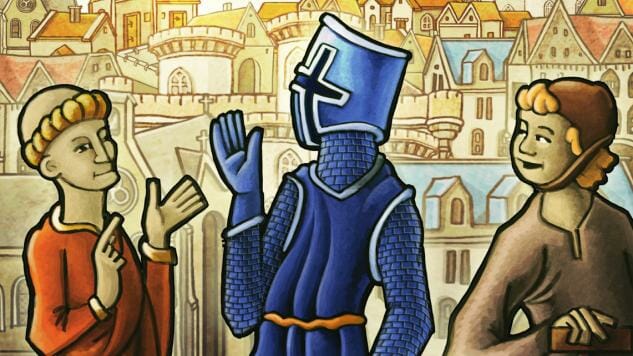Orleans Boardgame

Orleans was one of three games nominated for the 2015 Kennerspiel des Jahres (expert’s game of the year) prize, losing out to Broom Service, with Elysium also nominated. Orleans is very different from its two co-nominees, as it’s a longer, more involved strategy game that combines worker placement with the need to choose which of various tracks you’re going to pursue, forcing decisions with limited resources that affect what you’ll be able to accomplish in the rest of the game.
Taking place over 18 rounds, during which players may have anywhere from one to four or five turns, Orleans has a strong solitary element, with two to four players each beginning the game with four worker (“follower”) tokens, using them to gain more followers, earn money or goods or development points, or move around the game’s map to build trading posts. There are more things to do on the board than any player will be able to do in a single turn, and early in the game a player will only get one turn in a round—usually just adding a single follower to his/her supply. Such choices have long-lasting effects on what that player might be able to do later in the game; some moves open up more possible moves for later, while others are aimed primarily at increasing the player’s game-end points total.
Points in Orleans come from three sources: one point per coin, one to five points per goods tile (depending on the good in question), and the product of the player’s status on the development track (a multiplier from one to six) and the sum of his/her trading posts and citizen tiles. The citizen tiles are bonuses players can obtain from numerous spots on the board—the development track, some of the follower tracks, and from the Beneficial Deeds board, where players can sacrifice followers permanently for bonuses of money, movement on the development track, or citizen tiles. In our test game with four players, our final scores ranged from 91 to 102 points.
In a round, each player draws from four to eight follower tokens from his/her bag, which by game-end will include more than eight, and then can place those tokens on various spaces on his/her individual board in specific combinations to perform certain tasks—gaining a new follower of a specific type, moving the player’s merchant token to another town, building a trading post, moving on the development track, or sending followers to the Beneficial Deeds board to die a horrible death earn you coins and maybe a citizen tile. Players can also add a little expansion to their home boards when acquiring a Trader follower, with the expansions providing additional tasks for followers, often with substantial benefits. You need some balance in your followers so that you can make multiple moves in each round, and can add flexibility by acquiring monks, followers who can substitute for any other follower type like wild cards.
-

-

-

-

-

-

-

-

-

-

-

-

-

-

-

-

-

-

-

-

-

-

-

-

-

-

-

-

-

-

-

-

-

-

-

-

-

-

-

-









































